A Stone for His Slingshot
Tucked amid the Ben Hecht Papers at the Newberry Library in Chicago is an undated typescript of 21 pages, with a penciled heading: “Speech at dinner at Slapsy Maxie’s, L.A., financed by Mickey Cohen.” Hecht was, of course, a fabled writer for stage and screen, Mickey Cohen was the notorious Los Angeles gangland boss (recently portrayed by Sean Penn in the movie Gangster Squad), and the speech, which has never before been published, is one of the most riveting and remarkable Jewish fundraising speeches ever delivered. What gives?
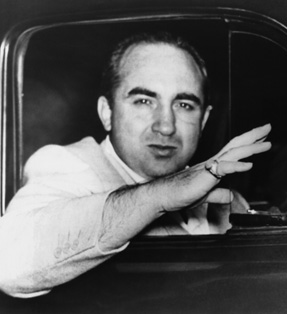
The outrageously prolific Hecht—writer of reportage, novels and short stories, Broadway theater and Hollywood movies, and eventually Jewish propaganda—was always attracted to outlaws. The first of his six or seven dozen produced (though not always credited) screenplays was Underworld, a 1927 silent film directed by the Austrian-Jewish immigrant Josef von Sternberg. In his freewheeling autobiography, A Child of the Century, Hecht wrote:
I made up a movie about a Chicago gunman and his moll called Feathers McCoy. As a newspaperman I had learned that nice people—the audience—love criminals . . . It was the first gangster movie to bedazzle the movie fans and there were no lies in it—except for a half-dozen sentimental touches introduced by its director.
Hecht won an Academy Award for Underworld, at the very first awards in 1929. (He was nominated five more times but never won another.) In 1932, he wrote Scarface for Howard Hawks, proudly claiming that “two Capone henchmen” showed up after midnight demanding assurance (which he disingenuously provided) that Scarface was not about “the great gangster.”
Meanwhile, Hecht had established his own reputation as a literary outlaw, notably with his novel A Jew in Love, a rapier-sharp vivisection of a contemptible book publisher named Jo Boshere, né Abe Nussbaum. Published in 1931, it sold some 50,000 copies and was voted best novel of the year by the senior class at New York’s City College, but influential Jews accused Hecht of self-hatred. The New York Times quoted Rabbi Louis I. Newman, of the Reform Congregation Rodeph Sholom, as saying that the book was “an atrocious malignment of the Jew.”
In A Child of the Century, Hecht tossed off the fictional Boshere as “this worthless fellow, who cost me much trouble with Jews who do not like the word ‘Jew’ used in a title.” Not quite. Hecht described one character as having “a face stamped with the hieroglyphic curl of the Hebrew alphabet” and elsewhere wrote of “that glandular degeneration that produces the Jew with the sausage face.” Writing for The Sentinel, a Chicago Jewish weekly, Bertha Loeb Lang wondered if Hecht was deliberately pandering to anti-Semites. Hecht, she wrote, “should seek something inspiring to wing his thoughts to higher realms.”
Such inspiration hit him hard in 1939, when Hecht, as he put it, “turned into a Jew.” As he recalled: “The German mass murder of the Jews, recently begun, had brought my Jewishness to the surface. I felt no grief or vicarious pain. I felt only a violence toward the German killers.” He put his furious pen to work in a daily column for P.M., the liberal New York newspaper, chastising “Americanized Jews” for their silence in the face of the growing massacre. In 1941 he wrote a column called “My Tribe Is Called Israel”: “My angry critics all write that they are proud of being Americans and of wearing carnations, and that they are sick to death of such efforts as mine to Judaize them and increase generally the Jew-consciousness of the world.”
Hecht’s two-fisted polemic caught the eye of a young Palestinian Jew living in America: Hillel Kook, a nephew of the great Rav Kook who went by the nom de guerre Peter Bergson, so as not to embarrass his family. Bergson was a disciple of the late Revisionist leader Vladimir Ze’ev Jabotinsky, who had died in New York exile in 1940. He enlisted Hecht in a campaign to fight Hitler and promote militant Zionism in America. Hecht churned out caustic newspaper ads about American and British indifference to the plight of the European Jews. He crafted the 1946 Zionist stage play A Flag Is Born, which drew large crowds and made so much money for the right-wing Irgun that they named a ship for him. (While illegally transporting 600 Holocaust survivors to Palestine, the S.S. Ben Hecht was intercepted by the British in March 1947; the refugees were detained in Cyprus, and crew members were jailed in the Acre prison.)
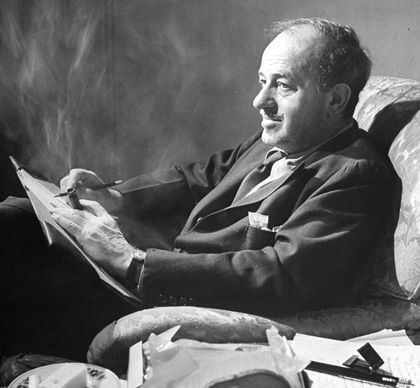
Hecht’s advocacy for the outlawed Irgun reached a brazen climax with a broadside that ran in the New York Post and elsewhere in May 1947, called “Letter to the Terrorists of Palestine.” “My Brave Friends,” he began, “the Jews of America are for you. You are their champions. You are the grin they wear. You are the feather in their hats . . . Every time you blow up a British arsenal, or wreck a British jail, or send a British railroad train sky high, or rob a British bank, or let go with your guns and bombs at the British betrayers and invaders of your homeland, the Jews of America make a little holiday in their hearts. Not all the Jews, of course.” The dissenters, Hecht went on, “unfortunately” included “practically all the rich Jews of America, all the important and influential ones, all the heads of nearly all the Jewish organizations whom the American newspapers call ‘The Jewish Leaders.’ They’re all against.” Ben’s big finish: “Hang on, brave friends, our money is on its way.”
Hecht’s fierce embrace of Zionism is a by-now familiar story of Jewish return, akin to the classic trajectories of Herzl, Heine, and Moses Hess. But it also suited Hecht, the perennial contrarian, to poke a stick in the eye of “Jewish respectables,” as he called them. It seems almost inevitable that the next stage in his evolution as a Jew was a fundraising partnership with Mickey Cohen (1913–1976). Cohen “took to burglary and violence as a duckling takes to water,” as Hecht wrote of him in the 1950s. He was a prizefighter, armed robber, occasional killer, extortionist, and bookmaking czar; he was also a germ-phobic dandy who shunned alcohol, hobnobbed with Hollywood stars, and craved publicity.
Mickey and Ben were both tough Jews, born in New York to immigrant families, but their commonality ran deeper: “Story-telling is the chief social activity of the underworld,” wrote Hecht in his Cohen piece (published posthumously in 1970 as “The Incomplete Life of Mickey Cohen” in the short-lived Scanlan’s Magazine). “Nearly every heister and gunman I have known was eager to play Scheherazade.” As Cohen told the story in his autobiography, Hecht contacted him in 1947: “At first I thought the guy was conning me—playing on me being a Jew kid.” The gangster and his bodyguard Mike Howard went for dinner at Hecht’s house in Oceanside, north of San Diego. Also present, says Cohen, was a representative of the Irgun:
This guy got me so goddamn excited. He started telling me how these guys actually fight like racket guys would . . . And then I threw a big affair to raise funds for the Irgun at Slapsy Maxie’s, which I had a piece of. There were judges there, people from all walks of life—every top gambler that was in the city or nearby.
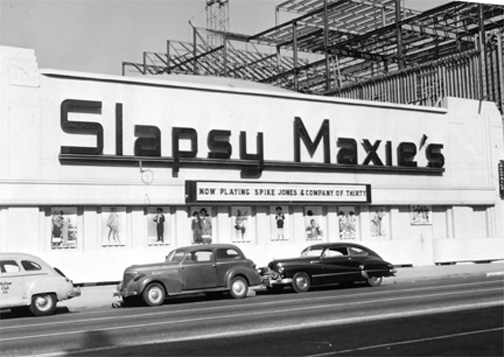
Cut to Slapsy Maxie’s Café, a popular nightspot on Wilshire Boulevard, east of Fairfax, operated by a Hollywood haberdasher called Sy Devore and his brother Charlie. It was at least partly backed by Cohen and fronted by the eponymous Maxie Rosenbloom, a onetime light heavyweight boxing champion and B-actor (he played himself in the 1941 comedy Harvard, Here I Come!). The date of the big Irgun affair is not to be found in Cohen’s memoir, nor in Hecht’s version in A Child of the Century. As Saul Bellow deadpanned in his Times review of the book: “Hecht is a rather difficult man to pin down.” Cohen’s biographer Brad Davis says it was “in June 1947, just prior to Bugsy’s murder,” but incorrectly places Menachem Begin in the room that night, “on the lam for the King David Hotel bombing.” Elements of Hecht’s speech clearly point to 1948, shortly after the establishment of Israel.
Hecht described the scene: “I addressed a thousand bookies, ex-prize fighters, gamblers, jockeys, touts and all sorts of lawless and semi-lawless characters; and their womenfolk.” Imagine a huge smoky nightclub out of Guys and Dolls with Ben, still shaky after gall bladder surgery, reading out an impassioned 45-minute pitch for the soldiers of the Irgun. (He even has a good word for the rival Haganah.) Hecht is fast and loose with facts about the Warsaw ghetto, FDR, refugee ships, Lord Moyne, and more. He slides into hyperbole, soars over the heads of his audience, but also hammers home a core concept of classical Zionism: “A Jewish nation will remove our mystery and give us origins and permit us to thrive in the world—on an equal footing with other nationals.” And his grand peroration still stirs the Jewish soul, if only as nostalgia: “A David stands against Goliath. I ask you Jews—buy him a stone for his slingshot.”
The hat was passed. The Hollywood demimonde ponied up with cash and pledges. Cohen shoved Mike Howard to the stage, ordering him to demand that everybody give double. “Quit crabbin,” Hecht reports Howard as replying, before he took the microphone, “We raised two hundred G’s. Furthermore, we been here three hours and nobody’s taken a shot at us.” The take for the night, according to the journalist Sidney Zion in Scanlan’s, was “$230,000 and no welshers.” Cohen’s rival mobster, Jimmy Fratianno, later said it was a scam and Mickey kept the money. Then again, Fratianno tried to kill Cohen in a shootout on Sunset Boulevard only a year later, and his nickname was “The Weasel.” For his part, Cohen claimed in his memoir that it was he who urged the Irgun to hang British soldiers in Palestine in revenge for the hanging of Jews: “If you don’t, that’s going to be the end of my involvement . . . And they done it.” (Indeed so: in Netanya, on Begin’s orders, in July 1947, though whether he was heeding Cohen’s advice is another matter.)
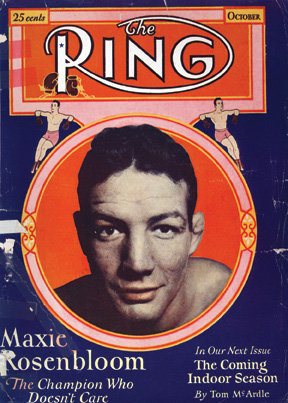
Hecht made another, much shorter speech in November 1948, at the Waldorf-Astoria in Manhattan, at a big banquet in honor of Menachem Begin. This speech, too, may be found at the Newberry: “For some of us who are present here tonight,” Hecht began, “this fine scene is the ending of a story.” The Irgun, by the fall of 1948, had ceased to exist, along with its American arm, the American League for a Free Palestine. “Tonight,” said Hecht, “we scatter, we who rang doorbells, passed the hat, put on rallies, cheered the spectacle returned to Palestine of David standing against Goliath—we go back to smaller things.” For Hecht, who had recently written Spellbound and Notorious, “smaller things” included Hitchcock’s Rope and the film adaptation of Guys and Dolls, both as an uncredited “script doctor.” He published A Child of the Century in 1954, which, until now, together with Cohen’s memoir, constituted the only published evidence of the night at Slapsy Maxie’s. In 1961, he published Perfidy, a denunciation of Labor Zionist treachery that remains canonical in some right-wing circles.
Hecht’s last, unfinished project was a book called Shylock, My Brother, whose manuscript I also examined at the Newberry. “I have felt sorry that so many Jews . . . fail to recognize Shylock as their brother, and turn their backs on him,” he wrote. “I have never found Shylock to be the villain against whom Jews keep protesting as a libel of their kind. To the contrary, he is one of the few heroic Jews in classic literature, perhaps even the only one.” Jabotinsky, Hecht reported, had argued “that Shylock was a valiant vindicator of Jewish grievances.” But for the timid Jews who fear “unfrightened Jewish voices,” Hecht scoffed, “the silent Ben-Gurion of Israel and not the cantankerous Shylock of Shakespeare is their idol.” He would have approved of Al Pacino’s recent aggressive portrayals of Shylock. To the end, Hecht was out to provoke. Speculating on Shakespeare’s motives, he concluded that the Bard was a crypto-Jew. Hecht died suddenly in April 1964, at the age of 70, in his apartment on West 67th Street in New York. Rabbi Louis I. Newman, his erstwhile antagonist, officiated at his funeral at Rodeph Sholom, and Menachem Begin flew in from Israel to deliver a eulogy.
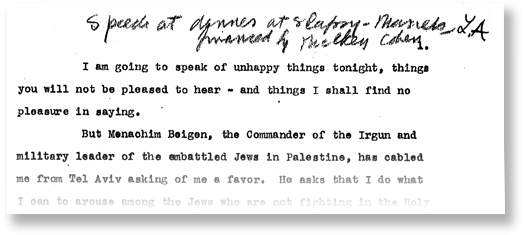
EDITORIAL NOTE: Ben Hecht’s typed speech has been modified here only slightly in matters of punctuation and spacing to enhance its readability. Some idiosyncrasies of have been left in order to retain the feel of the original document.
I am going to speak of unhappy things tonight, things you will not be pleased to hear—and things I shall find no pleasure in saying. But Menachim Beigen [sic], the Commander of the Irgun and military leader of the embattled Jews in Palestine, has cabled me from Tel Aviv asking of me a favor. He asks that I do what I can to arouse among the Jews who are not fighting in the Holy Land, the knowledge that without them the Holy Land will be lost. And with it will be lost forever the hope of the Jews taking their place as equals in the human family.
“We are fighting against great odds,” the Irgun commander says. “The enemy outnumbers us and is better equipped. His resources are unlimited. Great Britain is supplying him with its millions, its munitions, and its manpower. We have only ourselves. No nation will come to our side as ally or give us aid. We have only our brave soldiers and the long-dreaming soul of the Jews of the world. Speak to that soul wherever you can. If it can be awakened, we shall win.”
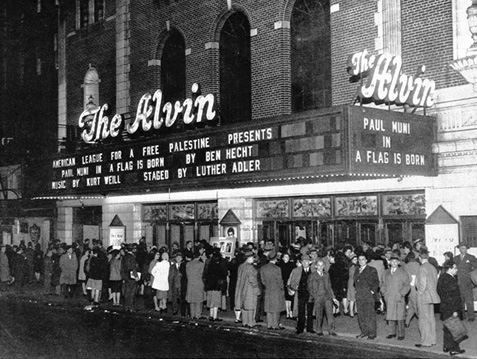
I shall speak to it tonight as well as I can. The soul of the Jew is an ancient and complicated business. It has been trained by disaster and calumny to live in caution, to hide itself cozily behind good deeds, to overlook insults, to charm its enemies, and to avoid getting its enemies angrier than they are. Thus hidden, thus full of cunning modesties and suicidal graces, it has remained nevertheless a brave soul—when destinies other than its own are at stake. It has fought and died valorously in defense of every cause but its own. Yes, it has the courage to fight and die for others. But it has hardly the guts even to speak in its own behalf. I know this soul of the Jew because I am part of it. And when the Irgun commander asks that it be wakened, he asks for a miracle. Awaken Jews into espousing their own cause—into believing in themselves—into grasping the battles of Palestine as their own bid for freedom; awaken them to knowing that victory in Palestine is a victory over anti-Semitism in every corner of the world. Commander Beigen asks for this miracle because he is a part of this miracle himself. He is the leader of an army of liberation that all the military power and political bedevilments of Great Britain were unable to dislodge.
While all the other Jews of the world and all their various synods and agencies cooed and hobnobbed with the British betrayer and usurper of their homeland; while all the other small Jews of the world let themselves be hornswoggled out of their honor and their hopes, the fighting Jews of the Irgun and their brave youthful allies named the Stern Gang—stood undaunted and uncompromising and battling as heroically as the Jews of the Warsaw ghetto. With one difference. They did not lose—not yet. The British lost.
For twenty-five years the mighty nation of Great Britain sought to steal Palestine—and failed. Because of the Irgun. Because Irgun soldiers died in battle. Because Irgun soldiers went singing to the British gallows—to hang where all the world could see—and did see—not a terrorist punished for crime but the look and sight of a Jewish patriot dying for his country. Now the Irgun asks for more miracles. It asks for us.
Let me remind you—who we have been. A few years ago in the days when the Germans were burning six million Jews in their lime pits and incinerators—a great and historic thing came to our ears. Thirty thousand Jews waiting in the ghetto of Warsaw to be taken off in the cattle cars to the German furnaces cried out to the world and to us, the Jews of the world—that they were not going to yield like sheep to the German butcher. They proclaimed that they were going to die in battle rather than let themselves be taken naked and unresisting to join the garbage pile of the Jewish dead. News of this event came over the radios of the world. It appeared in all the headlines. Thirty thousand Jews armed with pike poles, old guns and bombs made out of tin cans were giving battle to the German army in Warsaw. The German army marched upon the Warsaw ghetto with tanks, cannon, and flame-throwers. Outnumbered as in a nightmare, the Jews of Warsaw fought for twenty days, fought with wondrous valor—and with one eye on the sky.
They were waiting for help, for planes to appear and parachute weapons and supplies to them. No planes appeared. No weapons or supplies came out of the sky. No nation, fighting those same Germans, sent even a token pat on the back to these doomed warrior Jews. And from all the Jews of the world—from all of us—came not a single plane, a single gun, or a single loaf of bread to the thirty thousand who were battling not for their own survival—there was never any hope of that—but who were battling to bring a glow of human dignity to the pitiful and humiliated name of the Jews; our name as well as theirs.
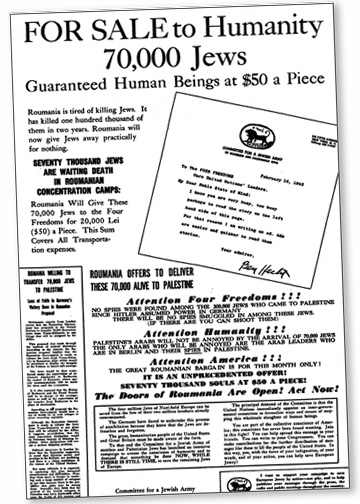
They were all killed—these men and women of Warsaw who fought for the honor of their kind. And the last of them who stood in the wrecked streets of their ghetto with their ammunition used up—and the German tanks and flame-throwers wiping them out—the last of them shook their fists at the sky; not at the Germans, but at the friendless sky.
Let me tell you why the sky under which the thirty thousand Jews died remained empty—why there was not a single package to fall from a single plane. Let me tell you also why none of the nations fighting for democracy—not even our own country—spoke up as a government officially, spoke out officially as a nation to offer aid, hope, or even that recognition of valor for which the Jews of Warsaw fought and died. The reason is this. The Allies fighting for democracy had a policy toward the Jews, a very definite and strategic policy. This policy had one basic objective—a refusal to recognize the existence of the Jews of Europe whether they died in the Warsaw ghetto fighting or were burned by the millions in the German lime pits and incinerators.
It is unpleasant to hear this. It is unpleasant to say this. But it is the truth.
I am going to name a date and a fact. Write it in your Jewish memories. This is the Moscow conference of the Allies in 1943. A great document is being drawn up by Great Britain, Russia, and the United States. This document is called officially “Statement on the German Atrocities.” And it states that the United Kingdom, the United States, and the Soviet Union have received from many quarters evidence of atrocities and cold-blooded mass execution done by the Germans. And in this Statement the Allies pledge themselves to avenge these monstrous deeds. They list—in their Statement—the wholesale massacres of Polish, French, Dutch, Belgian, Norwegian hostages. They list the peasants of the island of Crete—as German victims. They list sixty-two different categories of German victims. Every name is listed but the name of Jew.
There is no reference in this Statement to the bloody fact that three million Jews have been murdered—for no other crime than that they were Jews—and that another three million are waiting to die in the German ovens. At the time this statement is being written—a genocide bloodier than any in history is taking place—a race of people is being exterminated. And this fact has been proclaimed by the German exterminators—who stand red-handed before the world boasting of their deed—that the Jews are being wiped out—because they are Jews.
This Statement ignoring the killing of three million unarmed Jews, and turning its back on the impending murder of three more million, was signed by Prime Minister Churchill, Premier Stalin, and President Roosevelt. I know of no political gesture in history as bold and inhuman as blissful silence. A silence that was like a door closing furtively and surreptitiously on the murderer and his victim—our Jewish people.
Let me tell you why this door was closed—why the word Jew was erased not only from the eyes of the world but from its own tomb. You will believe me when I tell you … because on my honor, I tell you the truth. And it is a truth you will recognize because it has always been in your mind—as well as my own—whether you spoke it or not. The truth was that Great Britain did not want any official recognition of the Jewish massacre to be put in the record. It did not want the desperate status of the Jews recognized officially. It did not want the conscience of the world stirred up by the foulest crime in history. It did not want this done because there was only one place for the doomed Jews of Europe to go—only one place eager to welcome them—Palestine.
Great Britain did not want the world’s attention called to the spectacle of a good and noble race being exterminated. This might undermine their shabby little plan to steal Palestine for themselves. Official acknowledgement that Jews had been killed and their killing would continue until they were a race reduced to bones and ashes might startle even the befogged mind of the world of 1943 and set it crying out for a remedy. And what might this remedy be? Only this—to open the ports of Palestine given to the Jews twenty years before—and let in the Jews not yet slaughtered. The British were opposed to this remedy. British policy preferred that all the Jews of Europe be murdered—and that they die incognito in the German furnaces rather than that a single Jewish refugee enter Palestine.
Here is another fact to keep in your memories. During the height of the German massacres, two ships carrying several thousand such refugees arrived at the Palestinian port of Haifa. A man named Lord Moyne, the British governor of Palestine, looked on the thousands of men, women, and children who had come crawling out of the pogroms, blackened by the smoke of massacres; looked and refused to allow these two ships to land, and their passengers to disembark. Lord Moyne ordered the two battered refugee ships—called the Struma and the Patria—to sail off. They sailed away. He sent them back into the Mediterranean. They were blown up by English or German mines. Every human being aboard them was killed. Lord Moyne had stood at the breach. He had kept British policy intact.
And where was American policy during those wild days of a people’s extermination? Let me tell you. It stood firmly, grimly, side by side with Great Britain. Mr. Roosevelt concurred in this British plot to lock the Jews away with their German murderers—and ignore the deed—and let them all be killed rather than let the ports of Palestine be opened. President Roosevelt concurred on the Struma and the Patria.
And here is another fact to hold in your Jewish memories. Let me tell you of another secret American agreement—of President Roosevelt’s and his State Department’s concurrence in the murder of three hundred thousand Jews of Roumania [sic]. This is also not a pleasant thing to hear, nor yet to say. For Great Britain and the United States are both honorable countries—dedicated to honorable aims. And so far as it is possible for human masses to be kind and good, such kindness and goodness are to be found in the peoples of England and America. But—as always in history the Jews are the wrong yardstick with which to measure the virtues of nations, or of their leaders. But it is the only measure a Jew has—who kills him, who lets him live.
It was early in the war. Roumania was not yet overrun by German troops and officials. The Roumanian government sent out word that payment of fifty dollars a piece, it would release the Jews of Roumania before the Germans came in and started their extermination. The fifty dollars a head were to cover transportation expenses to Palestine. We published and advertised this fact, in a score of newspapers. The American State Department branded our information as a lie. Mr. Roosevelt branded the Roumanian government’s offer as a myth. There were no such Jews to be saved. And we who tried to rouse the conscience of the world to save them—we were liars and sensation makers. Pressed to take action, our government informed us angrily that it was unaware of this Roumanian offer.
It was our government that lied—not we. The truth has come out in the published letters of the State Department. There was such an offer made by the Roumanians. And our State Department wrote secretly to Arab leaders—Ibn Saud among them—not to fear an influx of Roumanian Jewish refugees into Palestine. These letters assured the Arab leaders that the United States would secretly quash the rescue of the three hundred thousand Roumanian Jews—among them fifty thousand children.
And it did. It held the breach—with Lord Moyne. It stood firm for five months—till the Germans swarmed into Roumania. And then our State department relaxed. For the Germans took care of the rest of the job of keeping the Roumanian Jews—including their fifty thousand children—out of Palestine. They were all slaughtered.
All these unpleasant things I have said to you not to arouse futile angers against villainy past and gone. I have said them only to point out the danger in which the Jew stands today. In his hour of destruction the Jew of Europe was without friends. Today in his desperate hour of rebirth the plot is still the same. The Jew is still without friends.
He fights alone in Palestine—against great odds, against increasing odds. And if we Jews whose souls are being fed and strengthened by his courage—whose status in the eyes of the world—is being forged by his valor—if we dreaming Jews of the four winds believe that any nation will ride to his aid—we are fools.
There will be no help from governments. The governments will continue to play their immemorial and secret games of sabotage against the Jews. In Palestine the outnumbered Jews battle today against an enemy officered, armed, and financed by the British. And like the Jews of Warsaw these Palestinian heroes battle with one eye to the sky. They wait for us. We are their arsenal. Not the Four Freedoms, not the good old U.S.A.—but we, the Jews of the four winds. But this you know, or you would not be here. And it is not to awaken you that I speak. You are awake or you would not be here. It is to arm your wakefulness and help you to waken others that I speak.
You will be asked—and you may even ask yourself—what is the stake of the American Jew in Palestine? What has he to gain by the birth and triumph of the new nation of Israel? I will answer this question, first, with another question. What did the American Jews lose in the mass murder of the six million Jews of Europe? That which he lost—he will never lose again if there is a nation in Palestine called Israel. For only a Jewish nation sitting among the other nations of the world will be able to prevent ever the mass executions of Jews that have been going on since the year Four Hundred.
In the fifteen hundred years of their wooing of Europe, the Jews have never been able to halt a pogrom. In fact, the more important, the more assimilated the Jews in a given country became, the more certain was their ultimate status in that country—disfavor and destruction. Out of this one fact—that they were a people who could be slaughtered with impunity—that there was even honor to be won in their slaughtering—has risen much of the anti-Semitism that hangs likes an ever-darkening cloud over the world’s Jewry. When the sky is clear above you, you may be sure the cloud is elsewhere. It shifts from nation to nation, from century to century. It does not go away. All the relationships made the Jews, all the honors won, all the medals hung on them have not been enough to move even our own most civilized of countries to raise a hand in their behalf—when the hour of doom struck in Europe.
Here is our record as American Jews—in that pogrom. We allowed ourselves to be bamboozled by the British policy in Palestine—which was also the American policy—of keeping the Jews out of the Holy Land. We went along with the delusion that the British and American governments were kindly governments and kindly friends of the Jews. We could not believe otherwise, being who we are and where we are, part of those governments.
We went along—cheering for those governments who with their mighty right hand were winning a war against the Germans—and with their sly left hand locking the Jews of Europe away with their exterminators—by closing the ports of their only refuge—Palestine. We cheered a war—and we cheered the extermination of six million Jews.
Behind the cloak of pretended military emergency, the British—and their American State Department concurrers—plotted the future of Palestine—a Palestine to be held by the British as a military base—a Palestine to be handed over to an Arabian puppet king—already established in Trans Jordan [sic] by the British. And as a sop to what was known as Jewish world opinion the British explained that they could not let the Jews into Palestine during the war—and during their extermination—because German spies might come in with them—and German sympathizers.
These are the same British who whistled the Grand Mufti and his colleagues back from their Hitler honeymoon—and spread a red carpet for their re-entrance into Palestine. They were Nazis, they had fought on the German side in the war. But this was a minor facet of their natures—a peccadillo to be forgotten and condoned in the light of the more important fact that they hated Jews and were willing to help the British drive the Jews out of Palestine.
Only one group of Jews in the world did not concur in these secret plottings and underminings of Jews. This was the Irgun Zwei Leumi—that fought and publicized with their blood each step of the robbery—whether it was robbery of honor, freedom, or land. And with their help, for they are now being forged into the fabric of the new Jewish state—the State of Israel will not, when the time comes again—be as daft and dizzy as we American Jews were. It will not be spun about by the fear of divided loyalties as we were. It will not be duped by the siren song of patriotisms that ignore the carnage of the Jews.
However muddled such a Jewish state of Israel may be, it will have a long memory—and a clear head toward Jews. And when the time of pogrom comes again—it will raise a clear voice, backed by a strong arm—for Jews. And this is the only weapon the Jews need to prevent another time of butchery. For the world is not a place of evil. The conscience of the world is a Godly and aspiring one. Its head is perpetually in a fog, but there is a light in its heart. A clarion voice such as will come from the nation of Israel—and such has never come from the scattered, duped, and bewildered Jews wooing their way in other lands—such a voice will halt the pogroms and mass executions of tomorrow.
Tonight the battle rages in the land of Israel. Let us also look on our record as American Jews toward this present war. We Jews made this war possible. We concurred in it. Not only we American Jews who think only of America, but the Jews who were already planning the future of Palestine. They, too, concurred in this war and abetted the enemy. They did worse. They blessed it—to win a smile of approval from the British, their good friends. I will explain: Twenty years ago when the British held Palestine under a League of Nations mandate—to prepare a Jewish homeland in Palestine—that was their assignment and their sworn task—twenty years ago the British in defiance of that mandate sliced off a major chunk of Palestine—called it Trans Jordan and handed it over to a puppet king named Abdullah.
There was an outcry from the Jewish patriots of Palestine—from the Irgun Zwei Leumi. But these were merely Palestinians. The great and important Jews who handled the future of Palestine were English citizens and American citizens. These accredited leaders of Jewry thought the rape of Palestine by the British and the lawless invention of an Arab state by the British—an unfortunate but an unpreventable thing. They protested—but never loudly enough to jeopardize their standing as British or American citizens. They protested—but they were good sports about it. And the warnings of the Irgun leaders that Great Britain was preparing a war against Palestine—the war that is going on now—were drowned in the polite concurrences of English and American Jews.
The British were able openly and lawlessly to finance this Arab state in Trans Jordan—on loans given them by the U.S.A. They proceeded openly to pour military equipment into the Arab state, to send thousands of British officers and strategists to King Abdullah’s side, to ship him planes, tanks, and all their latest military gadgets—and to pay the salaries of his army. This is the army—the Arab Legion—that fights the Jews today. Not the Palestinian Arabs who have lived in friendship with the Jews—but this British trumped up Legion—fattened by British gold and British propaganda for a generation.
And why did the British do this? Why this long and foresighted plan against the Jews? The answer is that the Arabs make better British Colonials than the Jews. The answer is that the Arabs, do they win Palestine, will not harass British trade and prestige in the east by building up a thriving industrial nation. The answer is that the Arabs will create a nation content to live off Great Britain, content to be its not too civilized vassal, cohort, and uncompetitive ally. And the Jews if they win—will not be that—despite the fact that an English citizen sits today as the first president of Israel. This is a hope for the British—but a small one. The Jews of Palestine—being shot down today by British guns, blasted by British planes, will be Jews when they win—a nation and not a vassal suburb of Downing Street, London.
And what have we American Jews to gain by the triumph of the Jewish nation now battling in Palestine? We are a happy people in the U.S.A. But we are happy as Americans, not as Jews. Not entirely happy—as Jews. The slaughter of our kind in Europe has left a wound in our spirits that our victory as Americans in the war has not entirely healed. It is a Jewish wound kept always open by the fear of the future. And despite the honors and positions we have won in America, we are no different as Jews than our fathers and grandfathers in Europe. We are like them, as Jews—uncertain, despairing, disenchanted, and always singing ourselves to sleep with the happy news that we have friends in court.
The Jews have always had friends in court—but they have never won a verdict. They have been always a noise without power, a talent without roots, a homelover without a doorstep of their own. They have worn fine clothes—and remained a fine nobody. They have always been going somewhere—but they have come from nowhere. And a man who comes from nowhere is a lesser man than one who comes from a place. There is always mystery and suspicion about such a man.
The nationalized soul of every nation, however civilized, abhors instinctively the nationalistic vacuum out of which the Jew is perpetually emerging. Having no land of his own, the Jew is looked on as a man who would—if given the chance—usurp the land of his host.
This has been true even of our own melting pot—a pot in which every immigrant has fused away his antecedents—except the Jew. A man from Sweden, Ireland, Luxemburg, Hungary, Italy—as soon as he loses the accents of those places—can become an American without suspicion or hyphen attached to him. The Jew, with or without accent—can become only an American Jew.
This is part of our stake in Palestine. A Jewish nation will remove our mystery and give us origins and permit us to thrive in the world—on an equal footing with other nationals. We can paradoxically become American then—for we will not be carrying around in our souls the confusion of what we are—and spreading this confusion among our always easily confused neighbors.
And we will not seem like the remnant of some stubborn religious sect given to weird and alien religious practices. Without losing our religion we will lose our two-thousand-year-old dangerous identity as religious fanatics—an absurd identity, but an identity ready made for the devilish schemes of bigots and rabble rousers; an identity that has brought intolerance and disaster down on us. We will lose that identity, for the land of Israel will have a flag, an army, and a congress to prove we are like other people—and that we stem from a normal state and not be black magic out of a hole in the past.
But there is a stake beyond these stakes of convenience and aggrandizement that we Jews have in the battle for Palestine. Is that battle lost—we Jews, all of us, are lost for another seven generations. We will have made our bid for human national status—whether we helped or hid our heads in a bag—and if this bid fails we will become a gabby and empty people, a gabby and defeated people—more so than ever in our history.
We will become losers. And this name will track us down in every city and village of America—and fasten itself to us. Not losers of a war—every nation has had that tag on it, but losers of the right to exist as anything but what we have been—the dubious guest in the house. If our bid for a flag and a homeland fails, we will all of us stand guilty before the world of an unworthiness. And this unworthiness we will, for a change, have deserved—if it comes to us. It is our duty to see that it does not come to us. It is in our power to prevent its coming. We will win—if the long dreaming soul of the Jew is wakened. Thus speaks the leader of the Irgun forces.
Let me remind you—once more—who this leader is and who these Irgun fighters are. Menachim Beigen and his troops are the Terrorists. That was what they were called when their stalwart hearts launched the battle against the British betrayers and invaders of their homeland. They are the same not-to-be-vanquished and not-to-be-silenced soldiers whose underground fight wrenched the Jewish situation out of the sly British hands; whose unceasing attacks and demands swept away the political fogs behind which the British were silently maneuvering the Jewish state into limbo.
These men and women of the Irgun stood alone. They had no friends in any court—not even the Jewish court. The common people of Palestine loved them, hid them, glowed with pride over them. But the accredited leaders of the long Jewish negotiations for a homeland looked with terrified eyes on this heroic spearhead of Jewish freedom—the Irgun. These leaders joined with all the other nervous, flag-frightened Jews of the world—in denouncing them. And for years the soldiers of the Irgun who fought with a British noose around their necks were called gangsters and terrorists, pirates and lawbreakers—as were the handful of intrepid folk who once rallied to the new flag raised above Lexington and Bunker Hill.
But this is past. The denunciations are done with. The accredited leaders of the world’s organized Jewry survive now or die forever behind the army that has come out of the Palestinian underground. And the Jews of the world who called names and were fearful, are proud today of these same Terrorists. For history has revealed them in their true guise—not that of Terrorists but of champions risen to restore the people of Israel to their lost estate as human beings. The Irgun is a dedicated army. It leads the fight. And beside it fights the brave army of the Haganah. They were political rivals of the Irgun. They are brothers in arms tonight.
Jewish money has poured into a thousand causes. But there was never any cause in Jewish history like this one. In Palestine, the ancient land of miracles—another miracle is happening; a miracle as sweet as any recorded in the Testament. A two-thousand-year-old dream of the Jews is coming true—a dream of manhood hidden away in the prayers and lamentations of two thousand years. [Two paragraphs in the original text crossed out by Ben Hecht.]
In these dark centuries that have never ended—the Jews carried the dream of Israel in their hearts. The Hebrew Nation of David and the Kings had been hammered to bits—but the bits refused to die. Every Jewish poet, every rabbi, and every worker at his bench kept alive this dream. In Spain after a thousand years of torment—the Jews still sang of their Jerusalem and their Holy Land. Jehuda Halevy [sic], the Hebrew poet of Spain, wrote of a homeland no Jew had seen for a thousand years:
Jerusalem, oh City of Splendor, oh bright home of the Jews—our spirit flies to you from many lands. In the East—in the far land of the cedar and the lemon trees our hearts lie. And our souls dwell beside the sun gone down on Israel.
The sun is no longer down. A champion fights in Palestine. He will not surrender. But he calls on us. He needs us.
If he loses, he will lose because we did not put a gun in his hand.
He will lose because we—and not he—were too small for the hour of Jewish destiny.
He will lose because the Jews of the world dreamed away the days of battle.
But these are only words I speak—words to wake up Jews if there are any asleep. He will not lose. No cause that had behind it the sweet and powerful dream of freedom—has ever lost. This dream does not stand on the battlefields alone. It stands in us.
There are twenty-eight million Arabs. There are British wealth and British officers—and British military equipment. There are eight hundred thousand Jews—besieged and encircled by this Goliath tonight.
A David stands against Goliath. I ask you Jews—buy him a stone for his slingshot.
© 1948 by Ben Hecht, All Rights Reserved
Comments
You must log in to comment Log In
Suggested Reading
Proverbs 8:22-31
Many have marveled at the wisdom of the biblical books attributed to King Solomon. Here, in a new translation by Robert Alter, is Proverbs' account of the birth of Wisdom herself, from The Wisdom Books: Job, Proverbs, and Ecclesiastes: A Translation with Commentary, now out with Norton.
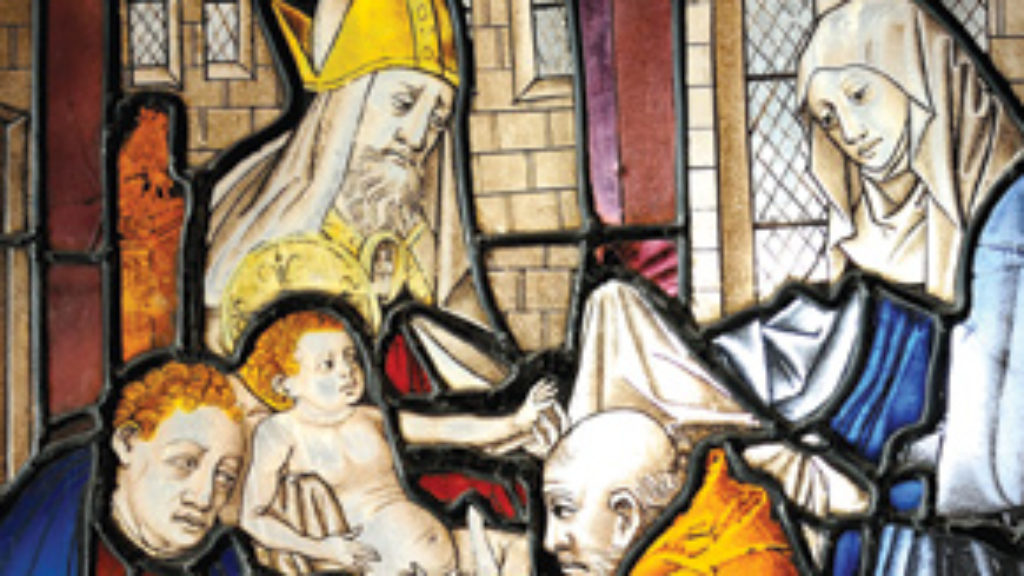
The Child Was Circumcised
The circumcision controversy in Germany has been heating up, but it's not the first time. The discussion has been going for centuries and has involved differing levels of overt anti-Semitism.
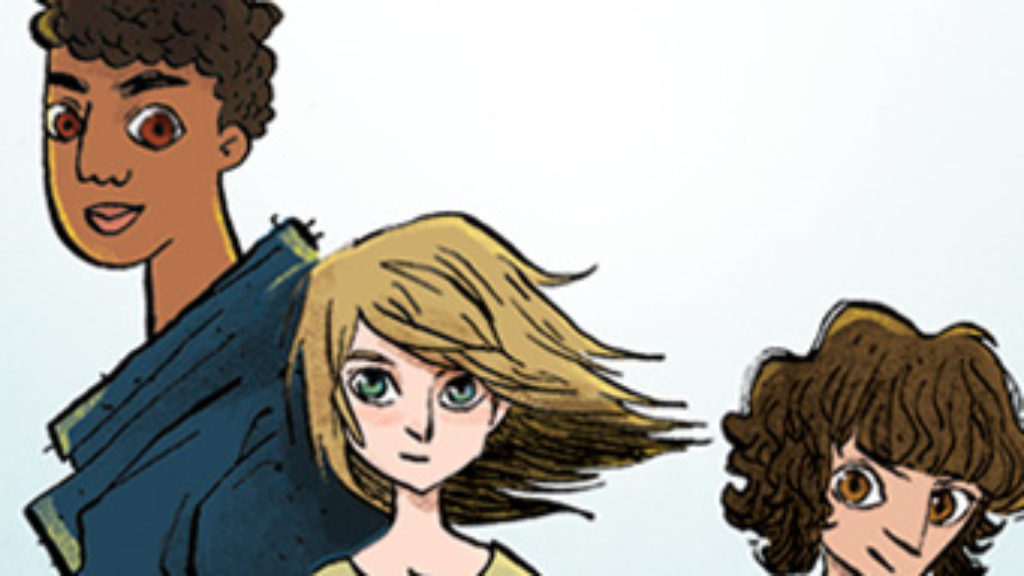
Talmuds and Dragons
Like the medieval literature to which it pays homage, The Inquisitor’s Tale weaves in supernatural events and divine interventions, mythic beasts and wild peoples, and even entrées into medieval theology, all liberally peppered with puns and potty humor.
Lost Music
Jeffrey M. Green, Aharon Appelfeld’s translator for more than 30 years, remembers the beloved Israeli novelist.
JewishPrincess
Thank you Stuart Shiffman. In reading your article, I felt Ben Hecht speaking to me from beyond. Some of the things Hecht said have been ruminating in my mind for years, and I've even written about diaspora Jews living in guest homes, some comfortable, some tenuous. We forget we are guests, soon to wear out our welcome no matter how loud we laugh at the host's jokes or how skillfully we help with the dinner dishes.
Hecht's words speak courage to me more than 70 years later. My natural bent toward snarky, purposeful provocation has been either discouraged or politely ignored, in the same way one might deal with a naughty child. The parent either provides negative consequences for the undesirable behavior, or ignores it, hoping it will go away.
Things aren't as they seem and not as history portrays. The seedier characters do the dirty work, and once accomplished, they fade into the darkness to be replaced by prissy diplomats that know how to use the right fork.
History is repeating itself, as there is nothing knew under the sun. Jews hide in Pallywood, castigating Israel-firsters as the price of admission, continue to kiss the tucheses of Roosevelts & Churchills and blame their compatriots for not kissing skillfully enough.
The current subterfuge is to frame Israel as the cause of all sorts of nasty stuff to come down, with the hope that American Jewish and Christian supporters of Israel can be infiltrated, psycho-socially manipulated and even physically threatened into switching allegiance or at least slithering into cowed silence.
But heaven has its moles and is activating sleeper cells who are beginning to realize who they are and what their purpose is for a time such as this.
chrismoyler
An utterly gripping article. I will read it several times to absorb its powerful message, which is even more relevant today than the day Ben Hecht gave his speech. Very many thanks JRoB
Sam Hilt
Thanks for publishing this extraordinary piece. It's pushed me from being a casual and occasional reader to becoming a full subscriber. As for the rest, the JewishPrincess has just said all as clearly and beautifully as anyone could wish for.
gwhepner
RESPECTABLES
RESPECTABLES
Looking at the Arabs through rose-tinted spectacles
are Jews for whom Ben Hecht coined the term
which I consider brilliant, “respectables,”
in the Jewish apple, each one a worm
who spoils the apple with a lot of rot,
giving hell to Jews, great journalists
whom Dante, if alive today, would spot
with other infamous infernalists.
[email protected]